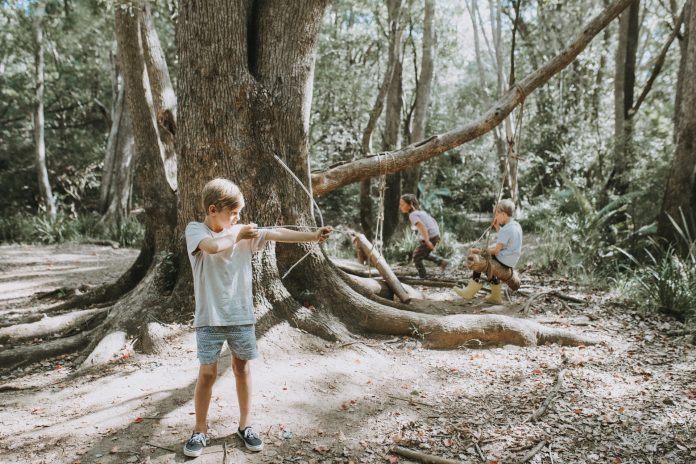Most children don’t enjoy homework, but the issue also divides parents, educators and experts
Under the shade of green trees, a group of young children discover the benefits of using hand tools. They have spent the morning foraging the forest floor for fallen branches, which they now use to create an outdoor shelter.
At first glance it may seem unorthodox to let a child loose with a saw, but under careful direction these young students have learnt how to safely handle a wide range
of tools. They can also tie knots, identify different flora and fauna, and they understand how to safely make a fire for bush cooking.
Here are Wildlings Forest School in Nambour, traditional learning gives way to rafting, climbing and archery. The concept is simple, explains founder Nicki Farrell: it’s about children learning naturally, in a natural environment.
The former high school teacher says this type of learning environment helps children develop confidence, self-esteem and creativity.
It also raises interesting questions: is there a balanced approach when it comes to education; and is after-school learning in the best interests of our young learners? It’s an age-old debate.
Do you have an opinion to share? Submit a Letter to the Editor with your name and suburb at Sunshine Coast News via: news@sunshinecoastnews.com.au

In 1900, Edward Bok editor of the influential American magazine Ladies Home Journal, kicked off an anti-homework campaign that led to the 1901 statewide prohibition of homework in California for any student under the age of 15. It was a move that attracted global attention.
Indeed, more than a century later, controversy still surrounds the subject of homework. There are the ‘helicopter’ parents who have been both praised and derided for their positive and – what others would consider – over-the-top attitude to any after-school work that will improve their children’s chances of academic success.
On the other hand, there is a cohort of parents who are happy to see their young students complete their homework during school hours and content to be guided by the teacher’s guidance and report card results.
Then there are the alternative educators, such as Ms Farrell, who promote outdoor activities and skills as a complement to the regular school curriculum.
Of late, homework has been on the agenda of Queensland Premier Annastacia Palaszczuk who says, “Homework is a very important part of every child’s education, but it can be a challenge for busy families at the end of the day.”
With that in mind, her government created a model for free homework centres which, will “provide a supportive, supervised environment for students to complete their homework”.
The government website promises these homework sessions will be managed by principals and held up to three hours per week for 30 weeks per year. The sessions will be supervised by teacher aides. The exact days and times the centres will operate will be determined by each school to meet community needs.

Sunshine Coast resident Nikki Jag James, mother of three children aged between 12 and 16 years, says supervised homework from qualified educators could be a support to parents, who may not have the education or expertise to help in particular areas of study.
She says she’s not a fan of having masses of homework, however she does believe a small amount is sufficient to supplement student’s day-to-day studies.
Get more Sunshine Coast News direct to your inbox by subscribing to our free daily news bulletin. All it requires is your name and email. See SUBSCRIBE at the top of this article
“If they get a little bit in primary school it preps them for a larger load in high school,” she adds.
Another Sunshine Coast resident, Jenni McNeish, has one son in high school and says the homework centres are a potential avenue of learning for students. However, at this stage, her son is able to finish his homework during classes.
A 2006 study led by Professor Harris Cooper of the Duke University in America showed efficacy of homework is much stronger for secondary students than primary students.
“Kids burn out,” Professor Cooper says. “The bottom line really is all kids should be doing homework, but the amount and type should vary according to their developmental level and home circumstances. Homework for young students should be short, lead to success without much struggle, occasionally involve parents and, when possible, use out-of-school activities that kids enjoy.”
Wildling’s Ms Farrell agrees with the majority of this research. However, she adds that the students should be included in the question of homework.
“We are advocates for children’s right,” she says.
She says time after school should be a time for school students to decompress and suggests that for some students six hours of school, perhaps including a part-time job, can make homework a difficult task.
“It is all about the students’ welfare,” she says. “School is not a job – and there should be choices.” This includes the choice of doing homework inside or undertaking physical activities outside.
Ms Farrell says as we live through COVID and education becomes an increasingly high-stake undertaking, there is more pressure on students than ever, and educators need to take this into account. She says when it comes to homework, “The question should be asked – is it necessary?”
Did you know?
An article by former Ladies Home Journal editor Edward Bok argued that homework was destroying American youth. Drawing on the theories of his fellow educational progressive, psychologist G Stanley Hall, Mr Bok argued that study at home interfered with children’s natural inclination towards play and free movement, threatened children’s physical and mental health, and usurped the right of parents to decide activities in the home.
5 tips for your high schooler
- Strategy – At the beginning of high school, talk with your child about work ethic, concerns and how homework is best tackled.
- Develop a plan – Create a timetable featuring school and extra-cirricular activities. This provides routine and avoids feelings of overwhelm.
- Turn to tech – Apps can make studying fun and more productive. For organisation, try the Homework App, or to block distractions, try Freedom.
- Environment – Create a comfortable and quiet space for your child. Pot plants, warm light and a scented diffuser are great elements to introduce.
- Use a mentor/tutor – A professional educator can help take the pressure of both you and your child.
Education Queensland homework guideline
The Queensland Government has set out guidelines for homework, including the amount of time students should spend on homework each week. Briefly, the policy recommends the following maximum homework hours over a week:
Prep – generally students will not be set homework other than daily reading.
Years 1, 2 and 3 – up to but generally not more than 15 to 20 minutes per night.
Years 4 to 5 – up to but generally not more than two to three hours per week.
Year 6 – up to but generally not more than three to four hours per week.
“Homework is a very important part of every child’s education, but it can be a challenge.”
Queensland Premier Annastacia Palaszczuk





